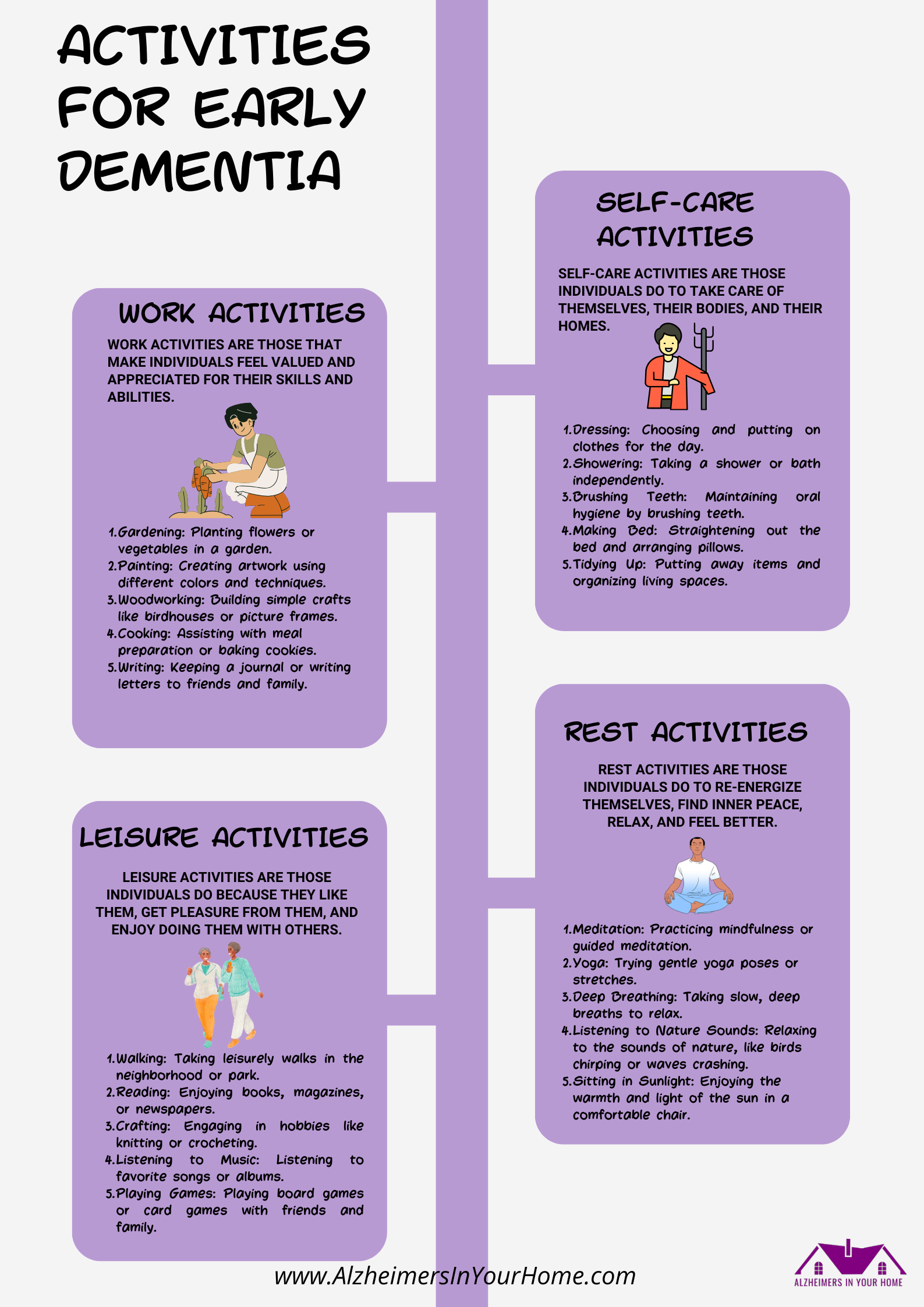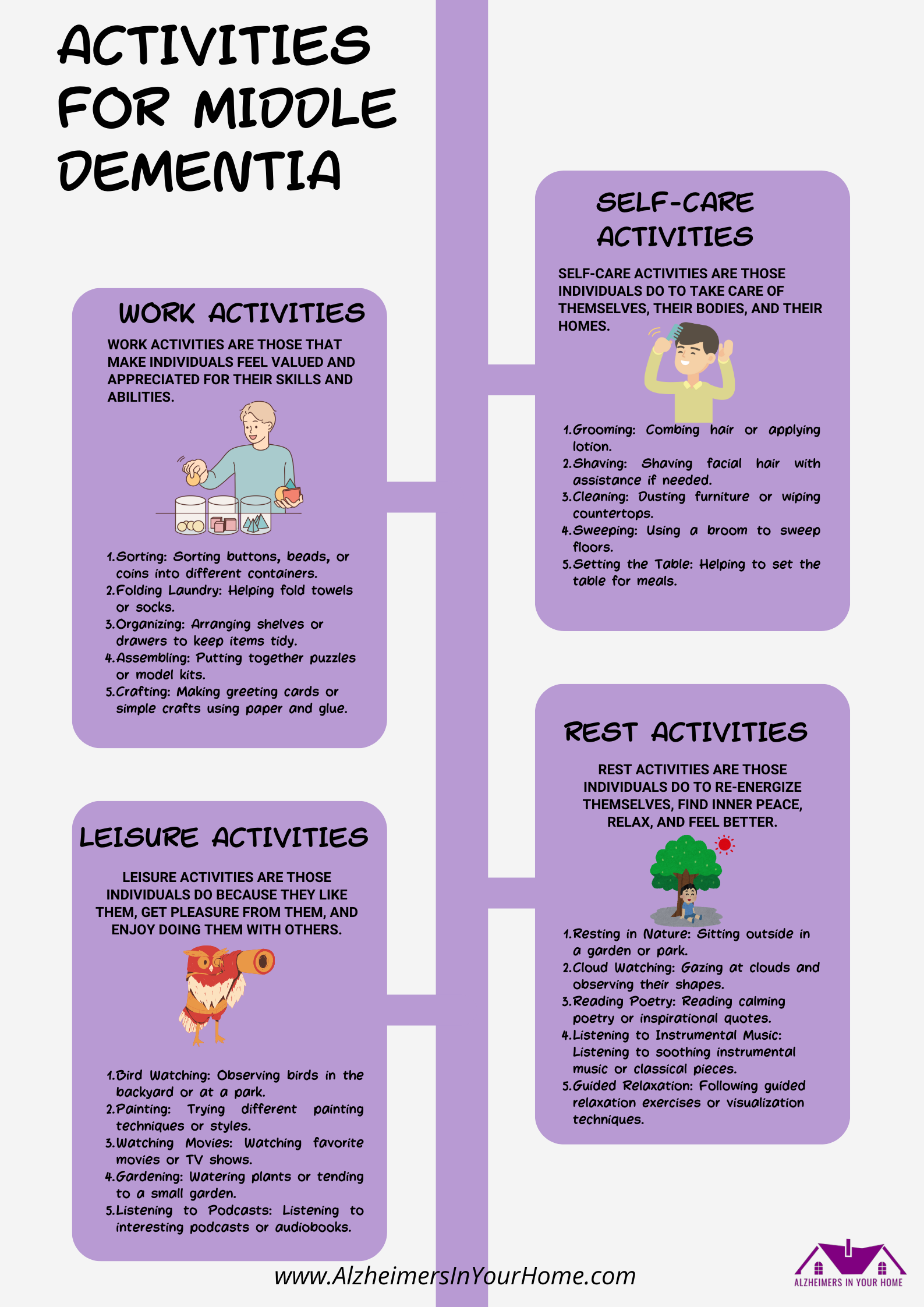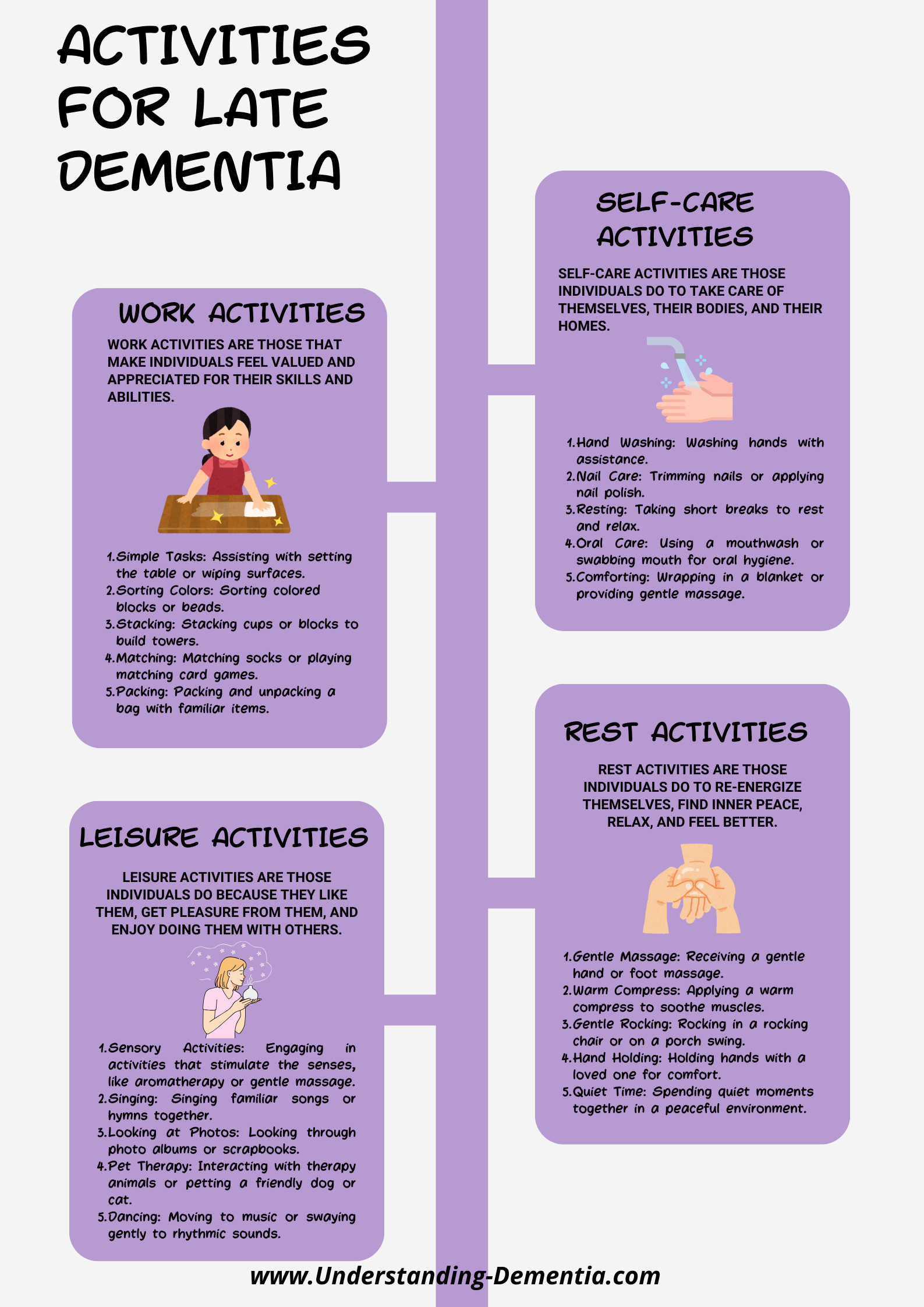Welcome to a conversation that’s close to my heart – enhancing the quality of life for our loved ones with dementia. It’s not always an easy road, but there’s something powerful we can do to bring a little light into their days: engaging activities.
Let’s start with why these activities are so darn important for individuals grappling with dementia.

Why Engaging Activities Matter:
When someone we care about is dealing with dementia, it can feel like we’re navigating uncharted waters. But here’s the thing: engaging activities are like little life rafts in that vast sea of uncertainty. They might seem small, but they can make a world of difference. Here’s why they’re so crucial:
Keeping the Mind Active:
Imagine if you had to exercise your brain like a muscle. That’s exactly what engaging activities do. They keep those mental gears turning, helping to maintain cognitive function and even slow down the progression of dementia. It’s like giving the brain a workout – but way more fun!
Bringing Joy and Comfort:
Picture this: your loved one’s face lighting up with a smile as they immerse themselves in a favorite activity. Engaging activities have the incredible power to bring joy and comfort to individuals with dementia. They’re like little rays of sunshine on even the cloudiest days.
Fostering Connection:
Let’s face it – dementia can be isolating. But engaging activities are like bridges that connect our loved ones to the world around them. Whether it’s reminiscing over old photos or dancing to a beloved song, these activities provide precious moments of connection with family, friends, and caregivers.
In short, engaging activities aren’t just nice-to-haves; they’re essential ingredients for a fulfilling life – especially for individuals grappling with dementia.
So, grab a cup of tea, pull up a chair, and let’s dive deeper into the world of engaging activities. Together, we’ll discover how these simple yet powerful activities can truly enhance the lives of our loved ones with dementia.
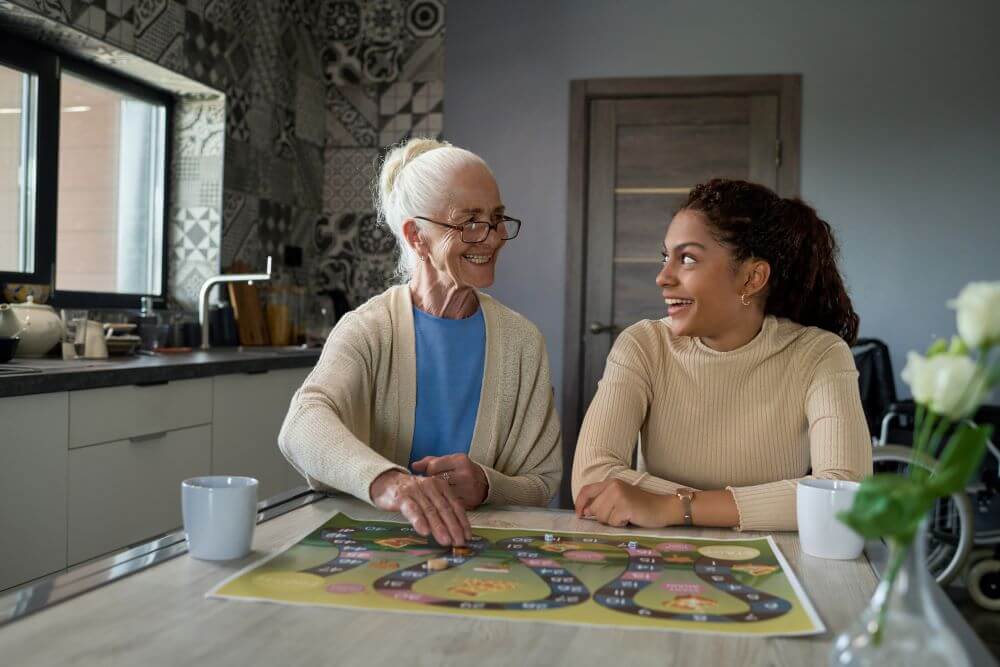
Importance of Engaging Activities for Individuals with Dementia
Engaging activities are like the magic wand in the world of dementia care. They’re any activities or experiences that captivate the mind, spark joy, and foster connection. These activities can vary widely, from reminiscing over old photos to gardening in the backyard or even enjoying a simple game of cards.
What makes an activity engaging is its ability to stimulate the senses, ignite memories, and bring a sense of fulfillment.
The Impact of Activities
Now, let’s talk about why engaging in activities is so much more than just a way to pass the time. They’re like superfoods for the brain and soul, offering a host of benefits:
Cognitive Function
Engaging activities act as mental gymnastics, keeping the brain agile and active. Whether it’s solving a puzzle or learning a new song, these activities challenge cognitive functions like memory, attention, and problem-solving skills.
Emotional Well-being
Imagine the feeling of joy that washes over you when you’re doing something you love. That’s the power of engaging activities. They have this incredible ability to lift spirits, reduce stress, and promote a sense of well-being. Whether it’s painting a picture or listening to music, these activities evoke positive emotions and create moments of happiness.
Social Interaction
One of the hardest parts of dementia can be feeling disconnected from the world. But engaging activities are like bridges that connect individuals with dementia to the people around them. Whether it’s sharing a laugh over a game or reminiscing with family members, these activities provide invaluable opportunities for social interaction and connection.
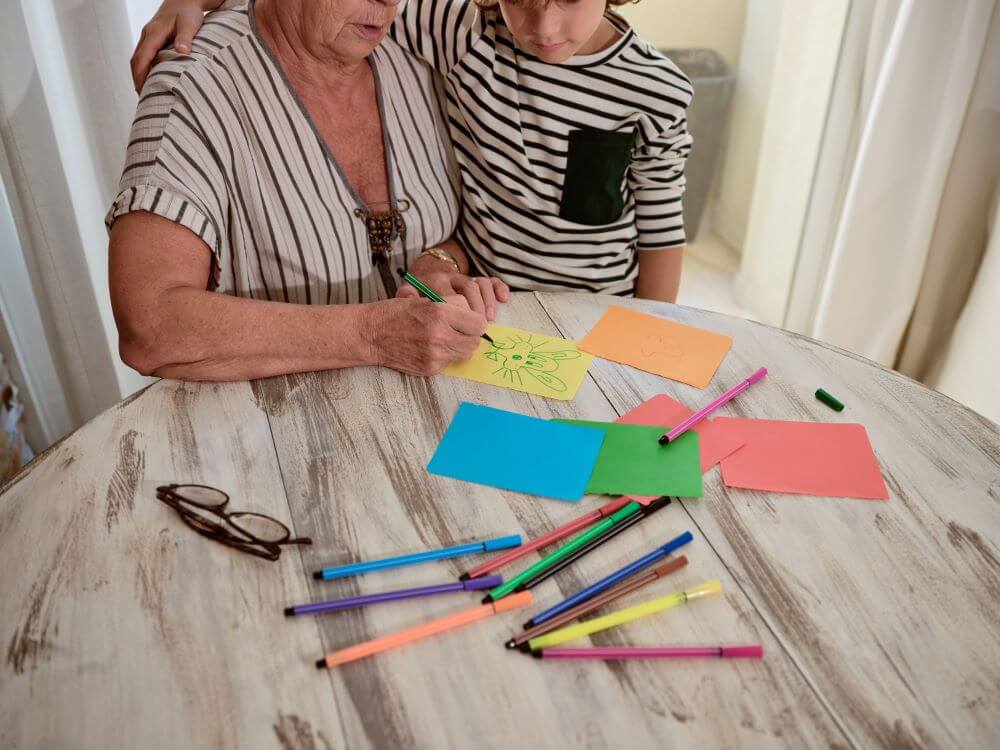
Tailoring Activities
Here’s the thing about engaging activities – they’re not one-size-fits-all. What works for one person may not work for another. That’s why it’s essential to tailor activities to individual preferences and abilities. For example:
- If your loved one has always been a nature lover, they might enjoy spending time in the garden, tending to plants and flowers.
- If music has always been a big part of their life, creating personalized playlists of their favorite songs can be incredibly comforting and stimulating.
- If they’ve always had a knack for creativity, art activities like painting or crafting can provide an outlet for self-expression.
Now that we’ve talked about why engaging activities are so important and how to tailor them to individual preferences let’s dive into some practical suggestions. Whether you’re caring for a loved one with dementia at home or in a care facility, there are plenty of engaging activities you can try to enhance their quality of life and well-being. Let’s explore some of these activities together.
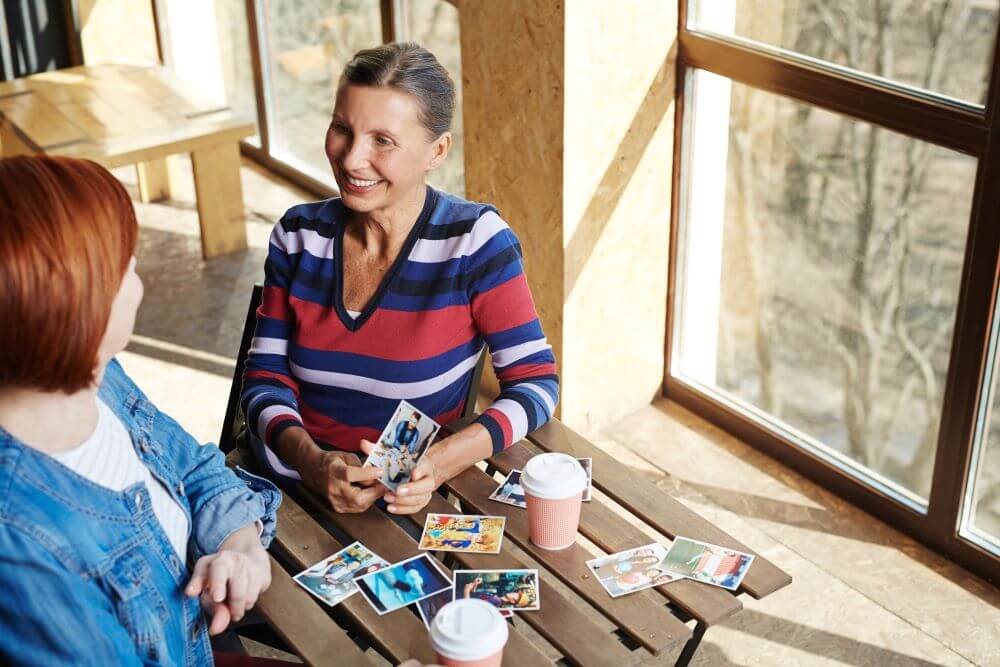
Practical Suggestions for Engaging Activities
Reminiscence Activities
Using photos, music, or familiar objects to trigger memories
Reminiscing over old photos can be a powerful way to spark memories and ignite conversations. Sit down with your loved one and flip through photo albums, pointing out familiar faces and places. Play their favorite songs from the past and watch as the music transports them back in time. You can also use familiar objects, like a favorite childhood toy or a cherished piece of jewelry, to evoke memories and stories.
Example: Gather around the dining table with your loved one and bring out the family photo album. As you flip through the pages, encourage them to share stories about the people and events captured in the photos. Watch as their eyes light up with each memory shared, creating moments of connection and joy.
Benefits of reminiscence therapy
Reminiscence therapy is more than just looking back on the past – it’s a powerful tool for promoting emotional well-being and cognitive function. By engaging in reminiscence activities regularly, individuals with dementia can experience a sense of validation, comfort, and connection. Reminiscing over positive memories can also help reduce feelings of anxiety and depression while improving overall mood and quality of life.
Example: Set aside dedicated time each week for reminiscence therapy with your loved one. Create a cozy corner with comfortable seating, soft lighting, and familiar objects. Bring out items that hold special significance, like old letters, souvenirs, or favorite books. Use these items as prompts to encourage conversation and storytelling, creating meaningful moments of reflection and connection.

Sensory Stimulation
Incorporating activities that engage the senses
Engaging the senses can be a powerful way to stimulate the mind and promote relaxation. Try incorporating activities that appeal to each of the five senses – sight, sound, touch, taste, and smell. For example, arrange a bouquet of fresh flowers for your loved one to admire, play soothing music or nature sounds, provide textured objects to touch and explore, offer a variety of snacks with different flavors and textures, and diffuse calming scents like lavender or vanilla.
Example: Create a sensory garden in your backyard or on a balcony. Plant fragrant flowers, herbs, and plants with interesting textures. Encourage your loved one to spend time outdoors, touching the leaves, smelling the flowers, and listening to the birds chirping. Not only will this engage their senses, but it will also provide a peaceful and calming environment for relaxation.
Positive effects on mood and relaxation
Sensory stimulation has been shown to have numerous positive effects on mood and relaxation for individuals with dementia. Engaging the senses can help reduce agitation, anxiety, and stress, while promoting feelings of calmness and well-being. By providing opportunities for sensory stimulation, caregivers can create a soothing and enjoyable environment for their loved ones.
Example: Set up a cozy sensory corner in your loved one’s room or living space. Include soft blankets, comfortable cushions, and items that appeal to their senses, such as scented candles, tactile objects like stress balls or textured fabrics, and calming music or sounds. Encourage your loved one to spend time in this space whenever they need a moment of relaxation and sensory stimulation.
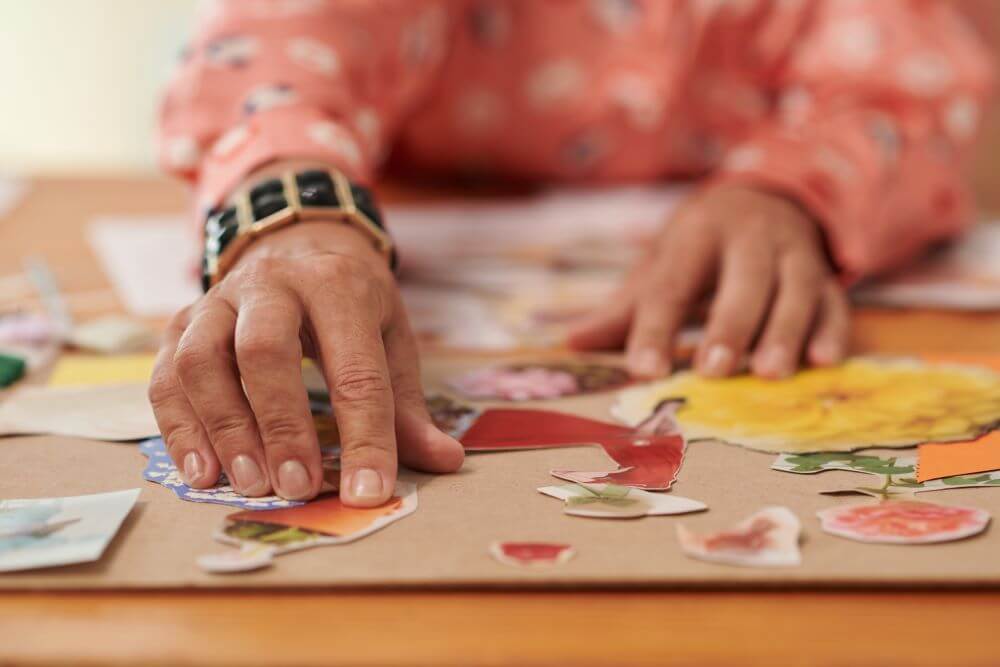
Creative Expression:
Encouraging art, music, dance, or other forms of expression
Creative expression can be a wonderful outlet for individuals with dementia to communicate thoughts and feelings, express themselves, and engage in meaningful activities. Encourage your loved one to explore different forms of creativity, such as painting, drawing, sculpting, singing, dancing, or playing musical instruments. Provide them with a variety of art supplies, musical instruments, or dance props, and support them in finding activities that they enjoy and feel comfortable with.
Example: Set up an art studio in your home or in a community space where your loved one can explore their creative side. Provide a range of art materials, such as paints, brushes, canvases, and clay, and encourage them to experiment with different techniques and styles. Offer guidance and support as needed, but allow them the freedom to express themselves in their own unique way.
Boosting self-esteem and sense of accomplishment
Engaging in creative activities can have a positive impact on self-esteem and sense of accomplishment for individuals with dementia. Completing a painting, writing a song, or learning a new dance move can provide a sense of pride and achievement. By offering opportunities for creative expression, caregivers can help boost their loved one’s confidence and sense of self-worth.
Example: Organize a weekly music therapy session for your loved one, where they can explore different musical activities and techniques in a supportive and encouraging environment. Provide them with musical instruments, song lyrics, and recorded music to inspire their creativity. Celebrate their achievements and milestones along the way, no matter how small, and encourage them to continue exploring their musical talents.

Physical Exercise
Importance of physical activity for individuals with dementia
Physical activity isn’t just about staying fit – it’s also crucial for maintaining overall health and well-being, especially for individuals with dementia. Here’s why getting moving is so important:
Improves Cognitive Function
Engaging in regular physical activity has been shown to boost cognitive function, including memory, attention, and problem-solving skills. Exercise stimulates the brain, promoting the growth of new brain cells and neural connections, which can help slow down cognitive decline.
Enhances Mood and Sleep
Exercise releases feel-good chemicals in the brain called endorphins, which can help improve mood and reduce feelings of anxiety and depression. It can also regulate sleep patterns, making it easier for individuals with dementia to fall asleep and stay asleep through the night.
Reduces Risk of Health Conditions
Regular physical activity can help reduce the risk of common health conditions associated with dementia, such as cardiovascular disease, diabetes, and obesity. It also improves circulation, strengthens the heart, and supports overall cardiovascular health.
Promotes Independence
Maintaining mobility and strength through exercise can help individuals with dementia maintain their independence for longer. By improving balance, coordination, and muscle strength, exercise can reduce the risk of falls and injuries, allowing individuals to continue performing daily activities on their own.
Example: Take your loved one for a daily walk around the neighborhood or to a nearby park. Not only does it provide the benefits of physical activity, but it also offers opportunities for social interaction and exposure to nature, which can further enhance their well-being.
Adapted exercises to promote mobility and strength
It’s important to choose exercises that are safe and appropriate for individuals with dementia, taking into account their physical abilities and any existing health conditions. Here are some adapted exercises to consider:
Chair Exercises: If mobility is limited, chair exercises are a great option. Simple movements like leg lifts, arm circles, and seated marches can help improve circulation, maintain muscle strength, and prevent stiffness.
Gentle Stretching: Incorporate gentle stretching exercises to improve flexibility and range of motion. Encourage your loved one to reach for the sky, touch their toes, and stretch their arms and legs in different directions.
Balance Exercises: Balance exercises are important for preventing falls and maintaining mobility. Practice standing on one leg while holding onto a sturdy chair or countertop for support, or try walking heel to toe in a straight line.
Tai Chi or Yoga: Tai Chi and yoga are gentle forms of exercise that focus on slow, controlled movements and deep breathing. These practices can help improve balance, flexibility, and relaxation while also reducing stress and anxiety.
Example: Set up a designated exercise area in your home with a comfortable chair, yoga mat, and any necessary equipment. Encourage your loved one to join you for daily exercise sessions, starting with simple movements and gradually increasing the intensity as they become more comfortable. Remember to praise their efforts and provide plenty of encouragement along the way.
Shelter of Calm:
Your Guide Through Dementia's Storm!
Is Dementia's chaos stealing your peace?
We're here to restore the calm, empowering you to confidently face each challenge.
Take the first step towards transformation now.

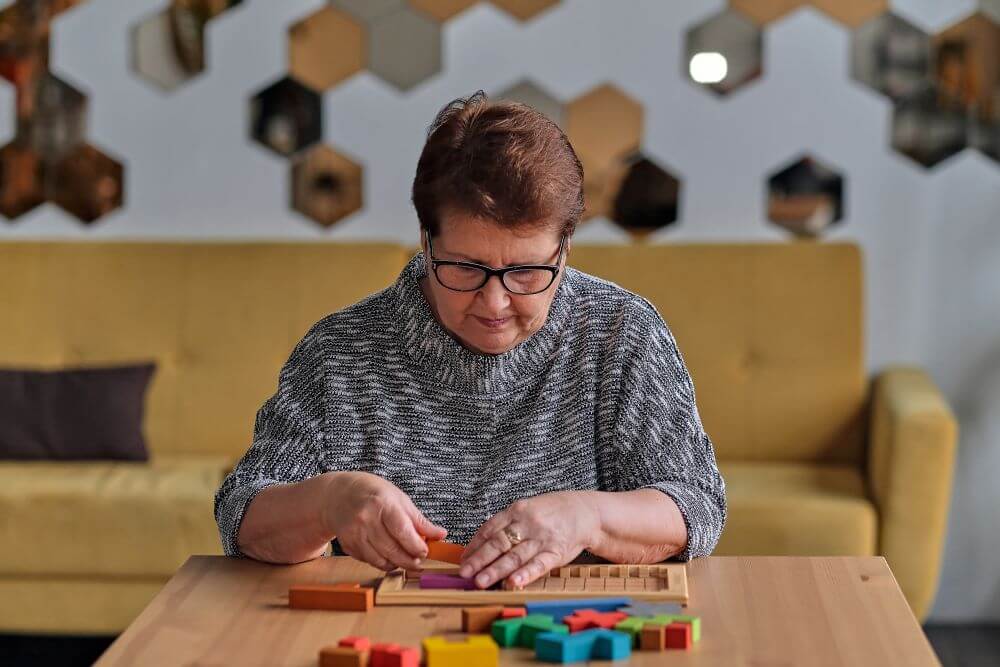
Enhancing Quality of Life through Meaningful Engagement
Overview of how engaging activities contribute to overall quality of life
Engaging activities are like the secret sauce that adds flavor and richness to the lives of individuals with dementia. They’re not just about passing the time – they’re about making every moment count. Here’s how engaging activities contribute to overall quality of life:
Stimulates the Mind
Engaging activities keep the brain active and stimulated, promoting cognitive function and delaying cognitive decline. From solving puzzles to learning new skills, these activities challenge the mind and keep it sharp.
Fosters Connection
Engaging activities provide opportunities for social interaction and connection with others. Whether it’s sharing memories with family members or making new friends in a group activity, these interactions help combat feelings of loneliness and isolation.
Promotes Emotional Well-being
Engaging activities have a powerful impact on mood and emotional well-being. They evoke positive emotions, reduce stress and anxiety, and provide moments of joy and fulfillment. Whether it’s laughing over a game of cards or feeling a sense of accomplishment after completing a project, these activities bring happiness and contentment.
Provides a Sense of Purpose
Engaging activities give individuals with dementia a sense of purpose and meaning in their lives. Whether it’s caring for plants in a garden or creating artwork, these activities provide a sense of accomplishment and fulfillment. They give individuals something to look forward to and a reason to get out of bed in the morning.
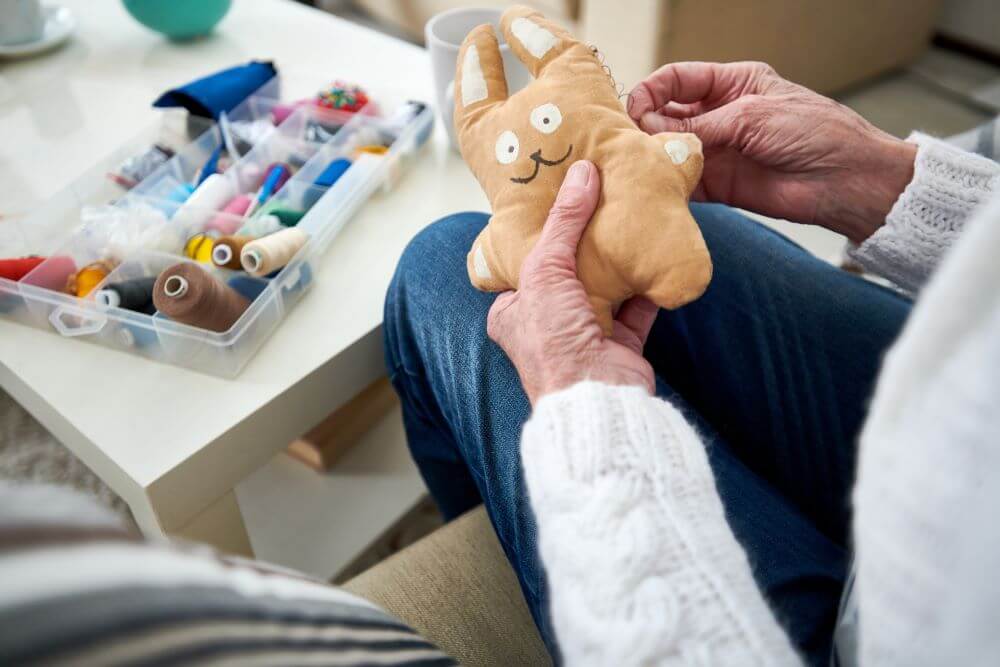
Importance of flexibility and individualized care
When it comes to engaging activities, one size definitely does not fit all. That’s why flexibility and individualized care are so important. Here’s why:
- Respecting Preferences and Abilities: Every individual is unique, with their own likes, dislikes, and abilities. It’s important to tailor engaging activities to each person’s preferences and abilities, taking into account their interests, hobbies, and past experiences.
- Adapting to Changing Needs: As dementia progresses, individuals may experience changes in their abilities and interests. Caregivers need to be flexible and adaptable, constantly reassessing and adjusting activities to meet the evolving needs of the individual.
- Creating Meaningful Experiences: By individualizing care and activities, caregivers can create meaningful experiences that resonate with the individual on a personal level. Whether it’s baking cookies together or listening to their favorite music, these personalized experiences have a profound impact on quality of life.
Now that we’ve covered the importance of engaging activities and the need for flexibility and individualized care, let’s dive deeper into the impact of meaningful engagement. We’ll explore how engaging activities can positively influence cognitive function, emotional well-being, and overall quality of life for individuals with dementia. So grab another cup of tea, and let’s continue our journey into the world of meaningful engagement.
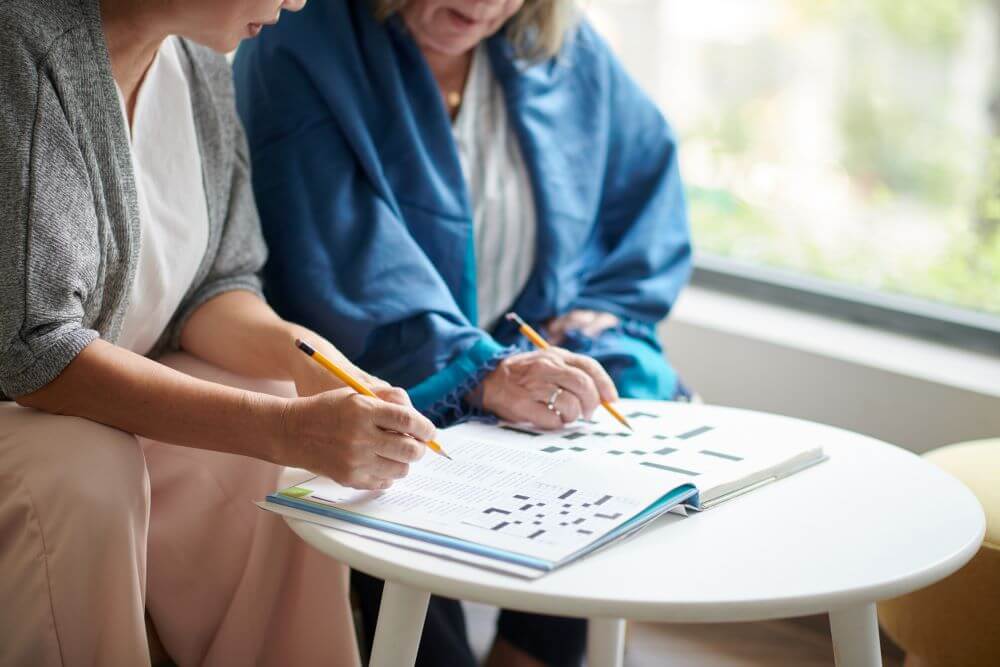
Exploring Meaningful Engagement
Increased Self-Esteem
Engaging in meaningful activities can work wonders for self-esteem, boosting confidence and fostering a sense of pride in individuals with dementia. Here’s how:
Celebrating achievements and fostering confidence: Taking the time to recognize and celebrate even the smallest accomplishments can make a world of difference. Whether it’s completing a puzzle, painting a picture, or simply remembering a name, these achievements deserve to be celebrated. By acknowledging their efforts and offering praise and encouragement, caregivers can help build confidence and self-esteem in individuals with dementia.
Example: Imagine your loved one successfully completing a puzzle they’ve been working on for days. Instead of just moving on to the next activity, take a moment to celebrate their accomplishment. Give them a high-five, clap your hands, and shower them with praise. Watch as their face lights up with pride and satisfaction, knowing that they’ve achieved something meaningful.
Connection with the Past
Engaging in activities that connect individuals with dementia to their past can evoke positive memories, foster a sense of identity, and provide comfort and reassurance. Here’s how:
Using activities to evoke positive memories and foster identity: Memories are like pieces of a puzzle – they make up the story of our lives. Engaging activities that tap into these memories can bring a sense of joy and nostalgia to individuals with dementia. Whether it’s flipping through old photo albums, listening to music from their youth, or cooking a favorite family recipe, these activities help individuals feel connected to their past and preserve their sense of identity.
Example: Sit down with your loved one and flip through a scrapbook of family photos from their childhood. As you look at each picture together, encourage them to share stories and memories associated with each one. Watch as their eyes light up with recognition and joy, as they relive cherished moments from their past.
Sense of Purpose
Engaging in meaningful activities provides individuals with dementia with a sense of purpose and fulfillment, giving them something to look forward to and a reason to get out of bed in the morning. Here’s how:
Providing fulfilling tasks to cultivate meaning and fulfillment: Everyone wants to feel like they matter – like they’re making a difference in the world. Engaging activities give individuals with dementia a sense of purpose and meaning by providing them with tasks that are both meaningful and fulfilling. Whether it’s tending to a garden, baking cookies for a family gathering, or volunteering in the community, these activities give individuals a sense of pride and accomplishment.
Example: Invite your loved one to help prepare a meal for the family. Whether it’s chopping vegetables, setting the table, or stirring the pot, give them tasks that they can actively participate in. Not only does this give them a sense of purpose, but it also allows them to contribute to something meaningful and enjoy the satisfaction of a job well done.
Conclusion:
Throughout this article, we’ve explored the incredible impact that engaging activities can have on the lives of individuals with dementia. From stimulating cognitive function to fostering emotional well-being and promoting social interaction, engaging activities are like the secret ingredient that adds flavor and richness to their lives. We’ve discussed the importance of tailoring activities to individual preferences and abilities, as well as the need for flexibility and individualized care. We’ve also explored the transformative power of meaningful engagement, from boosting self-esteem and fostering connections with the past to providing a sense of purpose and fulfillment.
Engaging activities aren’t just a way to pass the time – they’re a lifeline for individuals grappling with dementia. They have this incredible power to spark joy, stimulate the mind, and bring a sense of purpose and fulfillment to each day. Whether it’s reminiscing over old photos, enjoying a nature walk, or participating in a creative art project, these activities have the power to transform lives and enhance overall quality of life for individuals with dementia.
If you’re caring for a loved one with dementia, I want to encourage you to incorporate these strategies into your caregiving routine. Whether you’re a family member, friend, or professional caregiver, you have the power to make a difference in the lives of those you care for. Take the time to explore engaging activities that resonate with your loved one’s interests and abilities. Be flexible, be patient, and above all, be present. Your love and support, coupled with engaging activities, can truly make a world of difference in their journey with dementia.
In closing, remember that engaging activities aren’t just about filling the hours – they’re about creating moments of joy, connection, and meaning in the lives of individuals with dementia. So, let’s continue to explore, to innovate, and to find new ways to enrich the lives of those we care for. Together, we can make every moment count.
The Dementia Caregiver Blog Library
Activities, Advanced Directives, Agitation, Apathy, Approach, Apps for Caregivers, Basic Caregiving, Bathing, Bathroom Safety, Caregiver Burnout, Caregiver Compassion, Caregiver Emotions, Caregiver Help, Caregiver Loneliness, Caregiver Support, Cold & Flu Season, Communication Challenges, Dehydration, Dementia Complications, Dementia Doctors, Dementia Safety Home, Dementia Types, Dementia-Friendly, Dressing Issues, Driving Safety, Eating Problems, Fall Prevention, Family Help, Finances, Guns & Dementia, Harm Prevention, Healthcare, Help at Home, Hiding Dementia, Holidays, Hospice, Hospital Stay, In-Between Stage, Kitchen Safety, Laughter, Legal Healthcare, Marijuana use, Medication Tips, Music, Nutrition, Pain, Patience, Poop Problems, Relationships, Reminiscing, Routine, Safety, Sense of Purpose, Shadowing, Sleep Issues, Stages of Dementia, Sundowning, Television, Time Travel, Traveling, Toileting, Wandering
Exploring Caregiving Tools & Resources? Don't Forget to Check Out My Resource Page! 🌟

Hi, I’m Larea, a Certified Dementia Specialist and Registered Nurse with 30 years of hands-on experience helping dementia patients in various settings, from hospitals to nursing homes and hospice. Drawing on personal experiences with my family members and patients over the years, I’m here to help guide you on your caregiving journey.


